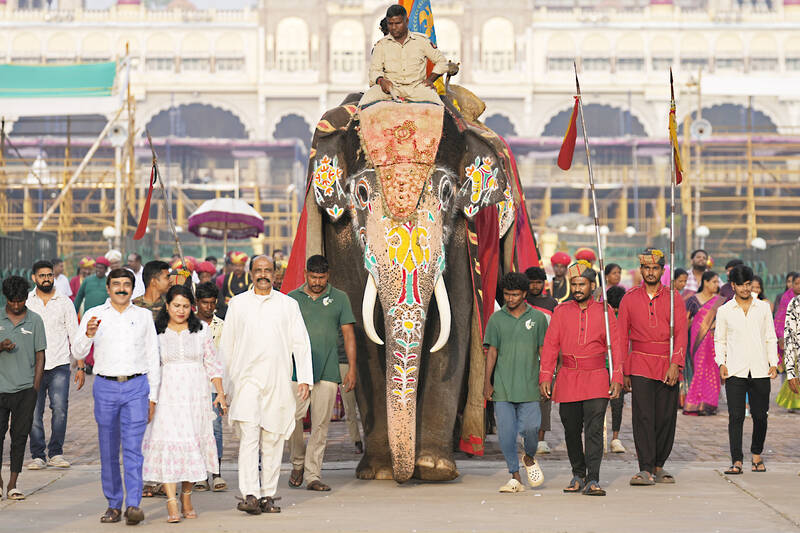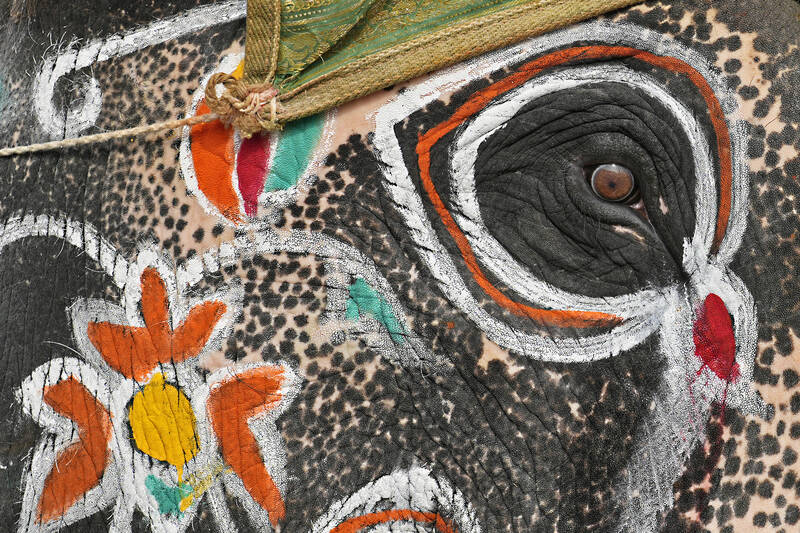A jumbo operation is moving 20 elephants across the breadth of India to the mammoth private zoo set up by the son of Asia’s richest man, adjoining a sprawling oil refinery.
The elephants have been “freed from the exploitative logging industry,” according to the Vantara Animal Rescue Centre, run by Anant Ambani, son of the billionaire head of Reliance Industries Mukesh Ambani, a close ally of Prime Minister Narendra Modi.
The sheer scale of the self-declared “world’s biggest wild animal rescue center” has raised eyebrows — including more than 50 bears, 160 tigers, 200 lions, 250 leopards and 900 crocodiles, according to the inventory from India’s Central Zoo Authority.

Photo: AP
The elephants are being transported the entire width of India, around 3,200 kilometers by road, from the misty forests of the northeast Himalayan state of Arunachal Pradesh to Jamnagar on the baking flatlands of Gujarat in the west.
It is a staggering journey, about the distance from Paris to Cairo, even for a zoo that has flown in animals from across the world.
The elephants include captive-born animals, some that had deep wounds from chains used by their handlers to control them and for dragging timber.

Photo: AP
They are being transported in “elephant ambulances” — specially adapted trucks — accompanied by a team of over 200 staff, including vets.
Photographs taken on their journey published by local media show the waving trunks of the elephants out the top of the slow-moving trucks.
The animals will eventually be housed alongside around 200 elephants already at the pet project of 29-year-old Anant, a vast operation that includes more than 2,000 animals from 43 species across a 3,000-acre site.
emotional recovery
“They will live chain-free and will never be forced into labour,” a statement from Vantara read, meaning “Star of the Forest” in Hindi.
They are to be homed in a site alongside the Reliance Jamnagar Refinery Complex, which the conglomerate also says is the world’s largest crude oil refinery. Summer temperatures there can soar above 50 degrees Celsius.
Indian social media has both posts praising the move — and those concerned that the endangered animals will be held in a private facility and not returned to the wild.
Two other elephants, from a Hindu temple complex in Mayapur in West Bengal state where they performed temple rituals, are also being brought to the zoo on a 2,300-kilometer journey. One of those elephants killed her keeper last year. Vantara said that “living in captivity causes significant mental suffering,” and insisted that their facility will now support the elephants’ “emotional recovery.”
Around 2,100 staff look after the animals at the zoo, according to Vantara.
The zoo was also among the many venues for Anant’s lavish muti-day wedding celebrations in 2024, parties that set a new benchmark in matrimonial extravagance — including private performances by R&B star Rihanna, Justin Bieber, Katy Perry, The Backstreet Boys and Italian tenor Andrea Bocelli.
Anant’s father Mukesh is chairman of Reliance Industries, a family-founded conglomerate that has grown into India’s biggest company by market cap.
Mukesh Ambani, who attended US President Donald Trump’s inauguration this week, is the world’s 18th richest person, with a fortune of more than US$95 billion, according to Forbes.

The Democratic Progressive Party (DPP), Chinese Nationalist Party (KMT), and the country’s other political groups dare not offend religious groups, says Chen Lih-ming (陳立民), founder of the Taiwan Anti-Religion Alliance (台灣反宗教者聯盟). “It’s the same in other democracies, of course, but because political struggles in Taiwan are extraordinarily fierce, you’ll see candidates visiting several temples each day ahead of elections. That adds impetus to religion here,” says the retired college lecturer. In Japan’s most recent election, the Liberal Democratic Party lost many votes because of its ties to the Unification Church (“the Moonies”). Chen contrasts the progress made by anti-religion movements in

Last week the State Department made several small changes to its Web information on Taiwan. First, it removed a statement saying that the US “does not support Taiwan independence.” The current statement now reads: “We oppose any unilateral changes to the status quo from either side. We expect cross-strait differences to be resolved by peaceful means, free from coercion, in a manner acceptable to the people on both sides of the Strait.” In 2022 the administration of Joe Biden also removed that verbiage, but after a month of pressure from the People’s Republic of China (PRC), reinstated it. The American

Chinese Nationalist Party (KMT) legislative caucus convener Fu Kun-chi (傅?萁) and some in the deep blue camp seem determined to ensure many of the recall campaigns against their lawmakers succeed. Widely known as the “King of Hualien,” Fu also appears to have become the king of the KMT. In theory, Legislative Speaker Han Kuo-yu (韓國瑜) outranks him, but Han is supposed to be even-handed in negotiations between party caucuses — the Democratic Progressive Party (DPP) says he is not — and Fu has been outright ignoring Han. Party Chairman Eric Chu (朱立倫) isn’t taking the lead on anything while Fu

Feb 24 to March 2 It’s said that the entire nation came to a standstill every time The Scholar Swordsman (雲州大儒俠) appeared on television. Children skipped school, farmers left the fields and workers went home to watch their hero Shih Yen-wen (史艷文) rid the world of evil in the 30-minute daily glove puppetry show. Even those who didn’t speak Hoklo (commonly known as Taiwanese) were hooked. Running from March 2, 1970 until the government banned it in 1974, the show made Shih a household name and breathed new life into the faltering traditional puppetry industry. It wasn’t the first